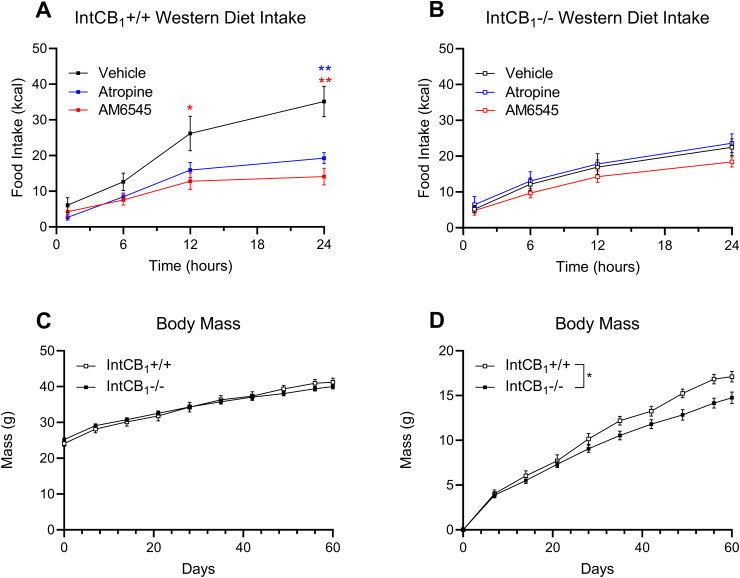Figure 9.
Inhibiting peripheral CB1Rs or mAChRs failed to affect food intake in mice conditionally lacking CB1Rs in the intestinal epithelium. A, AM6545 (10 mg/kg) or ATR (2 mg/kg) reduced caloric intake for up to 24 h in control intCB1+/+ mice (time × drug interaction, F(6,79) = 5.099; p = 0.0002; drug main effect F(2,30) = 6.024; p = 0.0063; 12 h vehicle vs 12 h AM6545 p = 0.0498, 24 h vehicle vs 24 h AM6545 p = 0.0012, 24 h vehicle vs 24 h ATR p = 0.0043, two-way ANOVA followed by Holm–Sidak's multiple-comparisons test). B, AM6545 or ATR did not affect caloric intake in intCB1−/− mice (time × drug interaction, F(6,135) = 0.7700; p = 0.5948; drug main effect F(2,45) = 0.9273; p = 0.4030; two-way ANOVA). C, Body weights were similar between intCB1−/− when compared to intCB1+/+ mice control mice fed with Western diet (WD; time × genotype interaction, F(9,225) = 5.327; p < 0.0001; genotype main effect F(1,25) = 0.01602; p = 0.9003; two-way ANOVA followed by Holm–Sidak's multiple-comparisons test). D, Change in body weight was lower in intCB1−/− when compared to intCB1+/+ control mice (time × genotype interaction, F(9,225) = 5.327; p < 0.0001; genotype main effect F(1,25) = 5.077; p = 0.0333; two-way ANOVA followed by Holm–Sidak's multiple-comparisons test). All data are presented as mean ± SEM, n = 16, 11 (intCB1−/−, intCB1+/+ respectively), p < 0.05, **p < 0.01.

